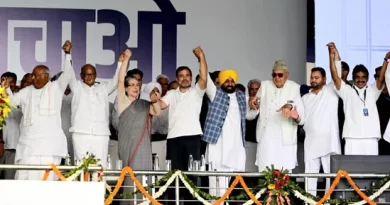Millions of workers will lose livelihood if COTPA Amendment Bill is implemented
New Delhi, Dec 13 : The proposed amendment to the Cigarettes and Other Tobacco Products (COTPA) Act puts the livelihood of millions of women in jeopardy. The new insertion — Section 10A(3), makes it mandatory for persons to obtain licenses, permissions and registrations for selling and distributing any tobacco product.
This insertion, if implemented, will be an extremely harsh measure for small vendors who do not have the competency or financial means to obtain such license. ‘Beedis’ are mostly sold by small vendors and hawkers who have a small scale set up for selling tobacco products.
Most of the sale of ‘beedis’ take place from micro shops situated under trees and on pavements which will not be recognised by the municipalities or given licenses.
Therefore ,the entire sale of beedis will come to a grinding and abrupt halt. If the sale of beedis comes to a halt, then the entire beedi industry will come to a halt.
A study by Vibha Vasuki, a Human Rights Lawyer and Dr. Siva Prasad Rambhatla, Senior Professor of Social Anthropology titled, “A Study on the Status of Alternate Employment Schemes for Women Beedi Rollers” delves into the impact this COTPA amendment will have on millions of women beedi rollers in the country.
The report says that until skill-building and alternative employment is provided on a large scale for their livelihood, Beedi rolling is the only viable occupation for millions of women across India.
The study states that beedis dominate tobacco consumption in India. They are thin, hand-rolled cigarettes that are wrapped in a tendu leaf and filled with tobacco.
About 7.7 per cent of adults in India smoke Beedis which have a market share of 85 per cent of all smoking products in India. Any anti-tobacco legislation largely impacts the Beedi industry.
The manufacturing process is highly labour intensive. The over hundred-year-old cottage industry employs workers in mostly the unorganised sector comprising mainly of home-based women workers from poor households. Ninety-six per cent of the total Beedi workers are home-based while only 4 per cent work in factories. A majority (84 per cent) of home-based workers are women while only 16 per cent are men.
As a member nation signatory to the WHO Framework Convention on Tobacco Control (FCTC), the Central Government is obligated to promote and provide suitable alternative livelihoods for tobacco workers, including Beedi Rollers.
Beedi workers are among the most marginalised communities in India. Despite legislation for their welfare, there is little evidence to suggest that much has been put into practice. There has been no allocation of welfare funds for Beedi workers since 2017-18.
Until skill-building and alternative employment is provided on a large scale for their livelihood, Beedi rolling is the only viable occupation for millions of women across India.
The study claims that since the passing of the Cigarettes and Other Tobacco Products Act (COPTA) in 2003, there has been a decline in the Beedi industry.
The anti-tobacco legislations have made it harder for the Beedi industry to survive causing a direct impact on the livelihood of Beedi workers.
There is little or no data to suggest that much has been done to provide alternative sustainable livelihood to Beedi workers. If the COTPA Amendment Bill 2020 is brought into effect, it will severely impact the livelihood of billions Beedi workers in India.
The study emphasises the need for alternative skill development and employment for women beedi rollers who are dependent on the beedi industry for their livelihood.
This book will be released on Tuesday, December 14, 2021 at India International Centre, New Delhi by Bhupender Yadav, Union Cabinet Minister for Labour and Employment, Environment, Forest and Climate change.
The event will be presided by Alejandro Simancas Marin, Cuban Ambassador. The Guests of Honour will be Rekha Sharma, Chairperson, National Commission for Women; Ashwani Mahajan, National Convener, Swadeshi Jagaran Manch, and B. Surendran, All India Organising Secretary, Bhartiya Mazdoor Sangh.




